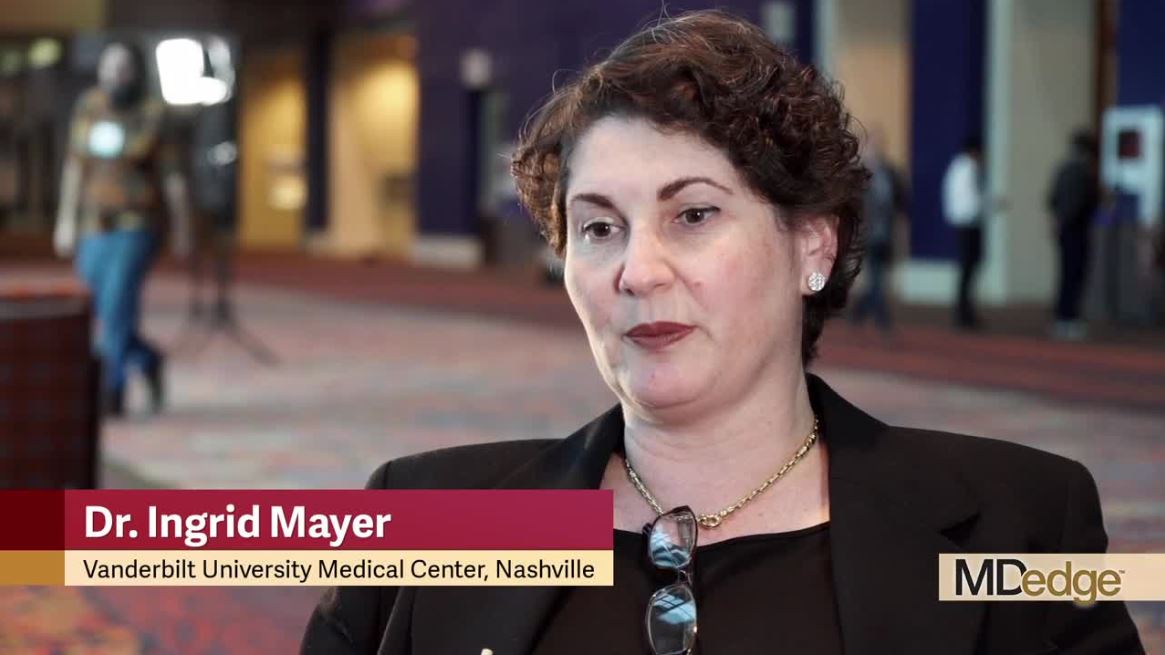User login
SAN ANTONIO – Phase 2 neoadjuvant endocrine therapy breast cancer trials can and should serve as a testing platform to inform the design of phase 3 trials with the ability to change practice, according to Ingrid A. Mayer, MD.
Correlating outcomes such as the Preoperative Endocrine Prognostic Index and Ki67 blood levels from phase 2 trials to larger, similarly designed trials could reduce costs, time, and the need for large numbers of patients, thereby promoting more efficient development of effective breast cancer therapies, she said during a plenary lecture at the San Antonio Breast Cancer Symposium.
In this video interview, Dr. Mayer, director of breast medical oncology at Vanderbilt University, Nashville, Tenn., explained that while neoadjuvant endocrine therapy is suitable for down-staging tumors in women with stage I-III breast cancer, it is not commonly used, as those patients are also good surgery candidates.
However, neoadjuvant endocrine therapy can be “an incredible platform” to test novel combinations of endocrine therapy agents with or without targeted treatments, validate new biomarkers, discover mechanisms of resistance, and predict the best combinations for moving forward in phase 3 trials, she said, adding that “this is something that all academic institutions potentially should be doing.”
Although the direct clinical benefit for patients who participate in such trials is not tremendous, participation has the potential to ultimately improve outcomes for participants and for “their friends and families and daughters,” and to help propel the science forward, Dr. Meyer noted.
“I would argue that we really should be moving forward to designing trials in the neoadjuvant endocrine setting more and more, and really utilizing this platform for that end,” she said.
Dr. Mayer reported having no relevant disclosures.
SAN ANTONIO – Phase 2 neoadjuvant endocrine therapy breast cancer trials can and should serve as a testing platform to inform the design of phase 3 trials with the ability to change practice, according to Ingrid A. Mayer, MD.
Correlating outcomes such as the Preoperative Endocrine Prognostic Index and Ki67 blood levels from phase 2 trials to larger, similarly designed trials could reduce costs, time, and the need for large numbers of patients, thereby promoting more efficient development of effective breast cancer therapies, she said during a plenary lecture at the San Antonio Breast Cancer Symposium.
In this video interview, Dr. Mayer, director of breast medical oncology at Vanderbilt University, Nashville, Tenn., explained that while neoadjuvant endocrine therapy is suitable for down-staging tumors in women with stage I-III breast cancer, it is not commonly used, as those patients are also good surgery candidates.
However, neoadjuvant endocrine therapy can be “an incredible platform” to test novel combinations of endocrine therapy agents with or without targeted treatments, validate new biomarkers, discover mechanisms of resistance, and predict the best combinations for moving forward in phase 3 trials, she said, adding that “this is something that all academic institutions potentially should be doing.”
Although the direct clinical benefit for patients who participate in such trials is not tremendous, participation has the potential to ultimately improve outcomes for participants and for “their friends and families and daughters,” and to help propel the science forward, Dr. Meyer noted.
“I would argue that we really should be moving forward to designing trials in the neoadjuvant endocrine setting more and more, and really utilizing this platform for that end,” she said.
Dr. Mayer reported having no relevant disclosures.
SAN ANTONIO – Phase 2 neoadjuvant endocrine therapy breast cancer trials can and should serve as a testing platform to inform the design of phase 3 trials with the ability to change practice, according to Ingrid A. Mayer, MD.
Correlating outcomes such as the Preoperative Endocrine Prognostic Index and Ki67 blood levels from phase 2 trials to larger, similarly designed trials could reduce costs, time, and the need for large numbers of patients, thereby promoting more efficient development of effective breast cancer therapies, she said during a plenary lecture at the San Antonio Breast Cancer Symposium.
In this video interview, Dr. Mayer, director of breast medical oncology at Vanderbilt University, Nashville, Tenn., explained that while neoadjuvant endocrine therapy is suitable for down-staging tumors in women with stage I-III breast cancer, it is not commonly used, as those patients are also good surgery candidates.
However, neoadjuvant endocrine therapy can be “an incredible platform” to test novel combinations of endocrine therapy agents with or without targeted treatments, validate new biomarkers, discover mechanisms of resistance, and predict the best combinations for moving forward in phase 3 trials, she said, adding that “this is something that all academic institutions potentially should be doing.”
Although the direct clinical benefit for patients who participate in such trials is not tremendous, participation has the potential to ultimately improve outcomes for participants and for “their friends and families and daughters,” and to help propel the science forward, Dr. Meyer noted.
“I would argue that we really should be moving forward to designing trials in the neoadjuvant endocrine setting more and more, and really utilizing this platform for that end,” she said.
Dr. Mayer reported having no relevant disclosures.
REPORTING FROM SABCS 2018
